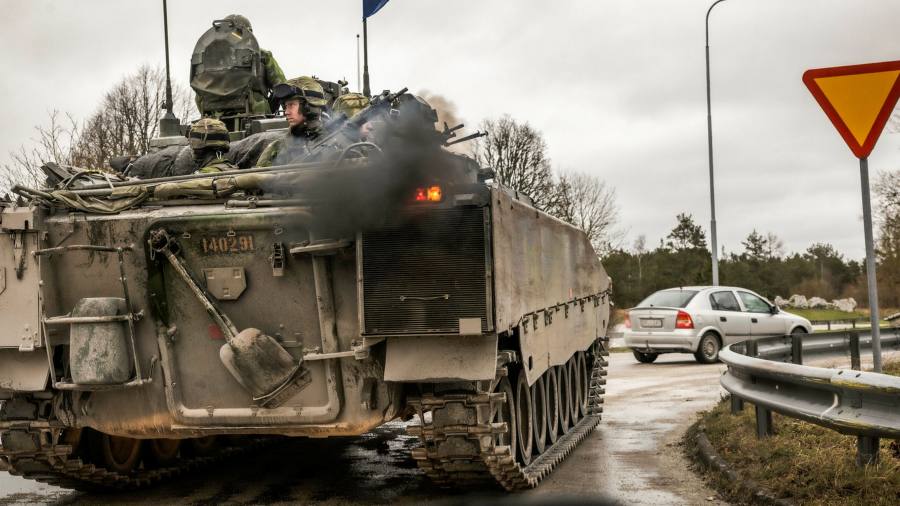President Vladimir Putin has insisted during the Ukraine crisis that NATO should stop its encroachments on Russia’s borders. But his demand has unintended consequences in Europe’s far north, fueling debate over whether Finland and Sweden should join the military alliance.
As the world’s attention focuses on Russian troops massing on the border with Ukraine, leaders from across the political spectrum of both Nordic countries have stressed that they are always welcome to apply for membership.
“The debate is lively and unprecedented. There is a lot going on. Much depends on what happens next,” said Henri Vanhanen, foreign policy and EU adviser to the centre-right National Coalition party, Finland’s main opposition group and pro-NATO member.
Swedish and Finnish foreign ministers met NATO Secretary General Jens Stoltenberg in Brussels on Monday, the latest in a series of diplomatic talks that have seen Finnish President Sauli Niinistö hold talks with both his American and Russian counterparts over the past few days .
“NATO’s door remains open. . . Sweden and Finland are our closest partners,” said Stoltenberg after the meeting.
Pekka Haavisto, Finland’s Foreign Minister, said: “Finland is not a member of NATO, but preserving national agency and autonomy of choice are also integral parts of Finland’s foreign, security and defense policies.”
Both Nordic countries, which have abandoned their traditional neutrality due to their EU membership and mutual defense clause, have grown closer to NATO in recent years, allowing their troops to cross their territory in times of crisis or during exercises.
Russia has threatened a sharp reaction should NATO expand further and include the two Baltic Sea countries. The Foreign Ministry in Moscow said in December that Sweden and Finland joining NATO would have “serious military and political consequences that would require an appropriate response from the Russian side”.
Anna Wieslander, director for Northern Europe at the US think tank Atlantic Council, said Russia’s own actions pushed Sweden and Finland to consider a move Moscow didn’t want.
“If we are comfortable in Sweden, there is not much pressure to change our security policy. There are other issues that are more important. They need this external threat and that is counterproductive for Russia,” she added.
Ann Linde, Sweden’s foreign minister, said she was “deeply concerned” by Russia’s intentions towards Ukraine and its “aggressive rhetoric,” while stressing the importance of having met with NATO together with Finland.
Sweden and Finland have recently deepened their mutual defense cooperation, and it has long been assumed that the two countries would act in lockstep any time they join NATO.
Observers believe Finland’s NATO entry debate is intensifying, possibly because it has never let down its military vigilance, maintains high defense spending and a large pool of reservists, while Sweden ended conscription and greatly reduced its armed forces.
Since hitting rock bottom in the early 2010s, when Sweden’s defense commander admitted it was unable to defend itself for more than a week and the country could not deploy jets as Russia practiced a mock bombing raid on Stockholm, Sweden has increased military spending and reintroduced conscription .

Soldiers patrol Visby harbor on Gotland, Sweden © Karl Melander/TT News/Reuters
Stockholm appears to be more politically divided on NATO than Helsinki. The ruling centre-left Social Democrats are staunchly opposed to membership, while the centre-right opposition is unanimous in wanting to join.
In Finland, centre-left Prime Minister Sanna Marin caused consternation last week when she said it was “very unlikely” that the country would apply for membership during her term. Faced with fierce criticism from an opposition that claims Finland should keep its options open, Marin said her comments had been “overinterpreted”.
Still, many in Helsinki repeat the half-joke that Finland is only “a sauna” away from joining NATO, meaning that the party leaders and the President could decide quickly – in a sauna or not – to apply for membership if the circumstances this required.
“If Finland were seriously considering NATO membership, we probably wouldn’t even know it at this point. It’s not advisable to show your cards beforehand,” said Vanhanen.
He added that Finland used its NATO option as a “deterrent” in its foreign policy, keeping its strategy and plan vague and its public statements subtle. Finland recently increased its military readiness but gave no details.

Tanks on the streets of northern Gotland © Karl Melander/TT News/AP
Sweden, on the other hand, sent convoys of military vehicles via highways and passenger ferries to the island of Gotland – often compared to an aircraft carrier in the Baltic Sea – in a conspicuous response to Russian ships nearby.
“I used to think that Sweden should take the lead as we are the largest Nordic country. But given the current momentum, I would rather bet that things could start faster in Helsinki than in Stockholm,” said Wieslander.
The debate is not only about what NATO membership could mean for Sweden and Finland, but also what the two countries – with their crucial strategic position in Northern Europe – could bring to the military alliance.
Kaja Kallas, Prime Minister of Estonia, told the Financial Times the decision will only apply to Sweden and Finland. But she added: “If they choose to do so, we would give them strong support in NATO.”
Kallas noted that they would add strong military capabilities and help the three Baltic states “which are like a peninsula in terms of Nato.” She added: “It would definitely strengthen the security situation here.”



